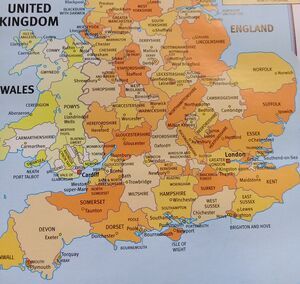Iceni
| Author:Laxman Burdak, IFS (R) |


Iceni were a Brittonic tribe during the Iron Age and early Roman era in the eastern Britain, the present-day Norfolk, parts of Suffolk and Cambridgeshire districts.
Variants of name
Location
Their territory included present-day Norfolk and parts of Suffolk and Cambridgeshire, and bordered the area of the Corieltauvi to the west, and the Catuvellauni and Trinovantes to the south. In the Roman period, their capital was Venta Icenorum at modern-day Caistor St Edmund.[1][2]
Name
The meaning of the name Iceni is unknown. In his 1658 treatise "Hydriotaphia, or Urn Burials", the English polymath Thomas Browne claims that the Iceni got their name from the Iken, the old name for the River Ouse, where the Iceni were said to have originated.[3]
Icenian coins dating from the 1st century AD use the spelling ECEN:[4] another article by D. F. Allen titled “The Coins of the Iceni,” discusses the difference between coins with the inscription ECE versus coins with ECEN. This difference, Allen posits, tells archaeologists and historians when Prasutagus started his reign because the coins did not start reading the name of the tribe until around AD 47. Allen suggests that when Antedios was king of the Iceni, the coins did not yet have the name of the tribe on them but instead the name of its ruler, stating, "If so, the coins suggest that the Prasutagus era commenced only after the events of 47" (Allen 16).[5]
The word ECHEN in Welsh as given by the Owen-Pughe etymological dictionary of 1832, the native language of Britain at that time, means origin or source; a tribe or nation.
History
Julius Caesar does not mention the Iceni in his account of his invasions of Britain in 55 and 54 BC, though they may be related to the Cenimagni, who Caesar notes as living north of the River Thames at that time. The Iceni were a significant power in eastern Britain during Claudius' conquest of Britain in AD 43, in which they allied with Rome. Increasing Roman influence on their affairs led to revolt in AD 47, though they remained nominally independent under king Prasutagus until his death around AD 60. Roman encroachment after Prasutagus' death led his wife Boudica to launch a major revolt from 60–61. Boudica's uprising seriously endangered Roman rule in Britain and resulted in the burning of Londinium and other cities. The Romans finally crushed the rebellion, and the Iceni were increasingly incorporated into the Roman province.</ref>[6]
Roman invasion
Tacitus records that the Iceni were not conquered in the Claudian invasion of AD 43, but had come to a voluntary alliance with the Romans. However, they rose against them in 47 after the governor, Publius Ostorius Scapula, threatened to disarm them. D. F. Allen explains in further detail, in his article "The Coins of the Iceni," that Scapula had been "preoccupied with defense against the unconquered Silures in South Wales and Brigantes in Yorkshire." Allen informs readers that this was how Prasutagus had come to gain full control over the Iceni (Allen 2). The Iceni were defeated by Ostorius in a fierce battle at a fortified place, but were allowed to retain their independence.[7] The site of the battle may have been Stonea Camp in Cambridgeshire.
A second and more serious uprising took place in AD 61. Prasutagus, the wealthy, pro-Roman Icenian king, who, according to a section in the Oxford Dictionary of National Biography titled "Roman Britain, British Leaders", was leader of the Iceni between AD 43 and 50 (Todd 4),[8] had died. It was common practice for a Roman client king to leave his kingdom to Rome on his death, but Prasutagus had attempted to preserve his line by bequeathing his kingdom — which Allen believes was located in Breckland, near Norwich (Allen 15) — jointly to the Emperor and his own daughters. The Romans ignored this, and the procurator Catus Decianus seized his entire estate. Prasutagus's widow, Boudica, was flogged, and her daughters were raped. At the same time, Roman financiers called in their loans. While the governor, Gaius Suetonius Paulinus, was campaigning in Wales, Boudica led the Iceni and the neighbouring Trinovantes in a large-scale revolt.
Further Research
Ikona (इकोना) is a village and site of Jat Fort in Gwalior tahsil and District in Madhya Pradesh. There is need to research further if there is any correlation between Iceni tribe and village Ikona. Boudica was a queen of the British Celtic Iceni Kingdom in England who led an uprising against the occupying forces of the Roman Empire in AD 60-61. She is considered a British folk hero.[9]
Notable persons
- Boudica - Queen
References
- ↑ Faoláin, Simon (2006). "Iceni". In Koch, John T. Celtic Culture: A Historical Encyclopedia. ABC-CLIO. pp. 954–955. ISBN 1851094407. Retrieved December 18, 2015.
- ↑ Snyder, Christopher A. (2003). The Britons. Blackwell Publishing. pp. 34–36; 40–42. ISBN 0-631-22260-X.
- ↑ "Hydriotaphia: Chapter II".
- ↑ "Hydriotaphia: Chapter II".
- ↑ Britannia, Vol. 1, Society for the Promotion of Roman Studies, 1970
- ↑ Snyder, Christopher A. (2003). The Britons. Blackwell Publishing. pp. 34–36; 40–42. ISBN 0-631-22260-X.
- ↑ Tacitus, Annals 12.31
- ↑ Oxford Dictionary of National Biography, Oxford University Press, 2004
- ↑ Pruitt, Sarah (31 May 2016). "Who was Boudica?". HISTORY.com. Retrieved 2018-01-31.

